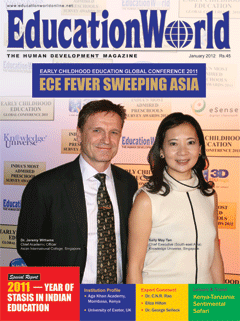 I wish to thank you for meticulously organising the Early Childhood Education Global Conference 2011 and the subsequent cover story ‘ECE fever sweeping Asia’ (EW January). The keynote addresses of Dr. Jeremy Williams and Sally May Tan were novel and excellent. We gained valuable information about the latest research in brain development — that 80 percent of intelligence and cognitive abilities develop in the early years.
I wish to thank you for meticulously organising the Early Childhood Education Global Conference 2011 and the subsequent cover story ‘ECE fever sweeping Asia’ (EW January). The keynote addresses of Dr. Jeremy Williams and Sally May Tan were novel and excellent. We gained valuable information about the latest research in brain development — that 80 percent of intelligence and cognitive abilities develop in the early years.
We also want to thank EducationWorld for awarding and recognising Sophia Nursery as one of Mumbai’s most admired preschools. But we regard this recognition as a challenge for us to deliver continuously improving preschool education.
Sr. Charlotte
Sophia Nursery, Mumbai
Preschool association call
Your first cover story of the year on the ECE Global Conference 2011 (EW January) was excellent. The consensus that emerged from the conference and panel discussions is that all preschool stakeholders need to cooperate, to establish an association to define and promote early childhood education.
I don’t think it’s necessary to depend on government to formulate a model preschool programme. Guided by experienced preschool educators and promoted by EducationWorld, this association can be set up this year. I am willing to offer all help in this endeavour.
S.M. Kutty
Magic Years, Delhi
Conference lacuna
Your cover story ‘ECE fever sweeping Asia’ (EW January) made enlightening reading. The high socio-economic development enjoyed by our Asian neighbours — Singapore, Taiwan, South Korea, Malaysia and China — is because of their heavy investment in early childhood education and education in general. Unlike our Central and state governments, they’ve acknowledged the vital connection between ECE and higher literacy and greater economic and social prosperity.
Though in your cover story you have complained about the lack of any Union and state government-funded ECE progra-mmes for the poor, I’m surprised that during the course of the Early Childhood Education Conference 2011 host-ed by EducationWorld, you didn’t deem this vital issue worthy of a panel discussion. Admittedly, all your fee-paying delegates were from the private sector and wanted to keep abreast of “latest brain discoveries” and “new pedagogies” in preschool educa-tion, but as a magazine committed to the ideal of quality education for all, you should have involved the elite audience in demanding ECE for the poor.
Only public — and in particular middle class — pressure can force the govern-ment to provide compulsory preschool education. EducationWorld should take the lead in mobilising public opinion to achieve this ideal.
Sumita Ganguly
Kolkata
Another wasted year
The special report ‘2011: Year of stasis in Indian education’ (EW January) aptly summed up 2011 as another wasted year for Indian education. With the Central and several state governments battling various corruption scams, improving the education system was a major casualty.
One can only hope that after wasting a year, the government wakes up to the education needs of millions of children, and implements meaningful reforms ensuring better learning environments in schools and colleges, and skills-based education on a mass scale.
Maya Kulkarni
Mumbai
Joint effort needed
Re your editorial ‘Anna’s draft Bill deserves unreserved support’ (EW January), corruption is growing unch-ecked in India because the government is failing to punish the corrupt. Government and society must act boldly and without fear. Our politicians and authorities must not shield the corrupt, and instead protect whistleblowers. To root out corruption in public life, a joint effort of the people, society, government and politicians is required.
If there’s political will, corruption can be minimised. The Lokpal Bill was not passed in Parliament because no political party is interested in curbing corruption. Given that most politicians have amassed huge wealth during their careers, it’s unlikely they will ever support a Bill to check corruption.
Mahesh Kapasi
Delhi
Wrong target
The main reasons why the Delhi government is closing down government schools in the state, are falling student enrolments and pathetic teaching conditions (Education News ‘Curious closures’, EW January). Even the poorest parents are pulling their children out of government schools and enroling them in private budget schools, which offer better learning outcomes with teacher accountability.
Instead of protesting the closure of government schools, self-styled educat-ionists such as Ashok Agarwal, promoter of NGO Social Jurist, should demand improvement of teaching-learning standards in government schools. Student drop-outs will reduce drastically with better teaching and infrastructure improvements.
But improving quality is a long and tough process, involving shaking up the teachers’ community. So instead of demanding the re-opening of under-performing schools, civil society must demand improvement in the quality of education in government schools.
Amit Mishra
Delhi
Words of praise
Thanks for the December issue of EducationWorld. The quality and presentation of the magazine is in a true sense reaching global standards. Congratulations for your sustained efforts! The cover story ‘Sliding reputation of Indian universities’ was interesting, with comments that we have been making for several years.
Dr. Arun Nigavekar
Pune